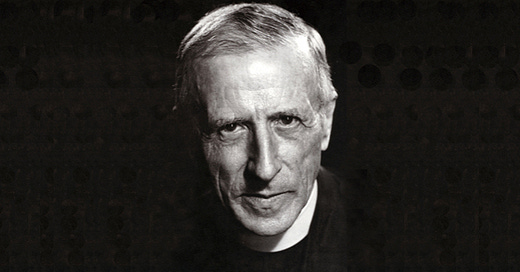I've had a little interruption in my writing schedule for the “Thinking” section of my book manuscript, The Spiritual Journey of Homo Sapiens. Ironically, the reason is that I've been doing too much thinking — specifically about Pierre Teilhard de Chardin. It started with an email out of the blue from a professor at the University of Michigan, who wanted to make sure I knew that this summer marks the 100-year anniversary of two pivotal events in the tangled history of science and faith. Both concluded, remarkably, on the very same day: July 21, 1925.
One was the infamous Scopes Trial, which was on my radar for its 100 year anniversary. It was a public spectacle that pitted modern science against a particular brand of religion. High school teacher John Scopes stood trial in Dayton, Tennessee, for teaching evolution, which technically broke the law, but was really just the convenient occasion to challenge that law. The courtroom battle became a media sensation (when media was just newspapers and radio), famously dramatized in a very good (though not entirely historically accurate) movie, Inherit the Wind.
According to the professor who emailed me, on the very same day but with much less fanfare, a Jesuit priest named Pierre Teilhard de Chardin quietly accepted a censure from his superiors. His writings and teachings on evolution and faith were judged too radical and unsettling. Teilhard was given an ultimatum: stop writing and teaching about evolution or leave the Jesuit order. Unlike Scopes, who boldly confronted his accusers in public, Teilhard chose submission and silence, staying within the authority of his community.
I've recently been immersed in Teilhard’s remarkable story, thanks in part to a PBS documentary that the professor pointed me to in his email. I found some intriguing parallels between his journey and my own — though, admittedly, mine was on a much smaller scale. When my own community expressed discomfort with my work on evolution and faith, I too was given an ultimatum. But I made the opposite choice from Teilhard: instead of submitting to their demands, I left the community, believing that my calling lay elsewhere, where I could more freely engage these important questions.
I wonder what would have happened if Teilhard had left the Jesuits. Would his work that was published posthumously have had the same effect? And I wonder what would have happened if I had stayed in my community and quit writing about evolution. Would I have been able to have some influence from the inside? Those questions will remain unanswered, I’m afraid.
I knew of Teilhard’s work, but now reading his most well-known book, The Human Phenomenon, I’ve found that his central insight deeply resonates with what I'm exploring in my book: the universe itself should be understood, after the discoveries of Darwin and Einstein, not merely as a static backdrop or stage for the main drama of creation. Instead, it has a vibrant and ongoing narrative of its own — a cosmic direction that is continuously unfolding and drawing us its story. Teilhard passionately emphasized that the universe is not yet complete; it is still becoming, still moving toward something profound and meaningful. In his view, all of creation is being drawn forward by God, guided by an inherent momentum toward greater unity and deeper expressions of love.
For Teilhard, this evolving universe isn’t just a cosmic spectacle to observe; it’s a story in which we humans, uniquely equipped with self-awareness, play a significant role. Our ability to reflect, create meaning, and choose our paths makes us active participants in shaping the future toward which the cosmos is heading — preparing both ourselves and our world for the coming Kingdom of God. Teilhard believed our consciousness was no mere accidental byproduct but rather a pivotal element in the divine intention to bring creation to its fullest expression.
All that has me thinking more about what I’m trying to write about in this section on Thinking. I’m not getting through my scheduled word counts, but maybe Teilhard himself would appreciate that sometimes the best way to make our thinking productive is to pause and reflect on where the universe, and our lives, are heading.




Teilhard is an interesting one. I wrote an essay on him when I was studying a Masters in Science & Religion a few years ago, though I was focused more on his interactions with the Chinese intellectual milieu during his time in China. I find some of his ideas thought-provoking (and some of his writing, like the "Mass on the World" is beautiful) but then am repelled by the racist/eugenicist aspect that appears in some of his work (I think his later work). Ah well - a complicated man, as most people are, and doubtless a man of his time in some regards!
I'm inspired by your perseverance, Jim, writing your latest book and still posting weekly.
Working in family medicine, I may compose a weekly essay for Substack, but I make little progress on my books. Perhaps I edit half of a chapter or send off a query, despite 6,000:1 odds against finding representation.
Thanks for writing about your journey. It encourages me—and I need it!
In case anyone else is still reading this comment, Jim and I grew up in the same town of Breckenridge, Michigan, until 1979. We attended the same church and had the same science teachers. Jim’s dad was the principle of our elementary school.
We were promising young students then, given special writing projects by our teachers. We are promising old students now, still writing away, both still loving faith and science, both, like Milton, still trying “to justify the ways of God to man.”
We haven't changed much!
TAT